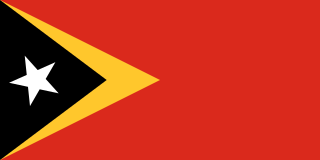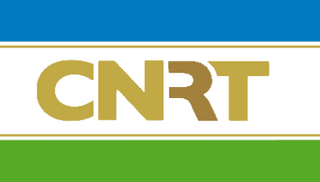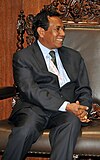
Kay Rala Xanana Gusmão, GColIH, GCL, GCMG is an East Timorese politician. A former militant, he was the first President of East Timor, serving from May 2002 to May 2007. He then became the fourth Prime Minister of East Timor, serving from 8 August 2007 to 16 February 2015. He has been Minister of Planning and Strategic Investment since February 2015.

The Revolutionary Front for an Independent East Timor is a leftist political party in East Timor. They presently hold 23 of 65 seats in the National Parliament and serve in the opposition. Fretilin formed the government in East Timor from independence until 2007. The party began as a resistance movement that fought for the independence of East Timor, first from Portugal and then from Indonesia, between 1974 and 1998. After East Timor gained its independence from Indonesia, Fretilin became one of several parties competing for power in a multi-party system.

The Portuguese legislative election of 2005 took place on 20 February. The election renewed all 230 members of the Assembly of the Republic.

The Prime Minister of Timor-Leste is the head of government in East Timor. The President is the head of state. The President of East Timor appoints the Prime Minister, after parliamentary elections and have listened to all parties represented in the National Assembly, who is usually the leader of the large party or coalition. The Prime Minister oversees the activities of the government and chairs the Council of Ministers.
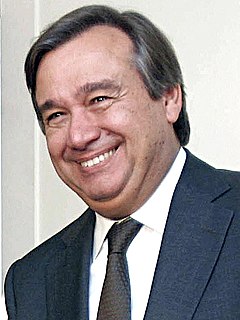
The Portuguese legislative election of 1995 took place on 1 October. The Socialist Party defeated the Social Democratic Party under the lead of António Guterres, elected three years before, but missed the absolute majority by 4 MPs.

The Portuguese legislative election of 1991 took place on 6 October. The Social Democratic Party, under the lead of Cavaco Silva, won a historic third term and won with an absolute majority for the second consecutive turn, achieving a higher share than in the previous election, losing, however, 13 MPs due to the reduction of the overall number from the original 250 to 230. Cavaco Silva became the first Prime Minister since Hintze Ribeiro, in 1904, to lead a party into three successive democratic election victories.

The Portuguese legislative election of 1985 took place on 6 October. In June of the same year, the former Prime-Minister, Mário Soares, had resigned from the job due to the lack of parliamentary support, the government was composed by a coalition of the two major parties, the center-right Social Democratic and the center-left Socialist, in what was called the Central Bloc, however this was an unstable balance of forces and several members of each party opposed such alliance.

The Timorese Democratic Union is a conservative political party in East Timor. It was the first party to be established in the country on May 11, 1974, following the Carnation Revolution in Portugal.

A parliamentary election was held in East Timor on 30 June 2007. Although a narrow plurality was achieved by the Revolutionary Front for an Independent East Timor (FRETILIN), a coalition involving the next three largest groups formed a government. New Prime Minister Xanana Gusmão of the National Congress for Timorese Reconstruction (CNRT) was sworn in on 8 August 2007; Fernando de Araújo of the Democratic Party became President of the National Parliament.

Francisco Guterres, popularly known as Lú-Olo, is an East Timorese politician who has been President of East Timor since 2017. He is also the President of Fretilin, and he was President of the National Parliament of East Timor from 2002 to 2007. As the Fretilin candidate, he stood in the 2007 presidential election and 2012 presidential election, but was defeated in the second round by independent candidates on both occasions. He also contested the 2017 presidential election, and with the support of former Prime Minister Xanana Gusmão and his party, National Congress for Timorese Reconstruction (CNRT), he was elected as President.

José Luís Guterres is an East Timorese politician and diplomat.

The Ukrainian parliamentary election of 2012 took place on 28 October 2012. Because of various reasons, including the "impossibility of announcing election results" various by-elections have taken place since. Hence, several constituencies have been left unrepresented at various times.

Legislative elections in Portugal were held on 27 September 2009 to renew all 230 members of the Assembly of the Republic. The Socialist Party, led by incumbent Prime Minister José Sócrates, won the largest number of seats, but didn't repeat the overall majority they gained in 2005.
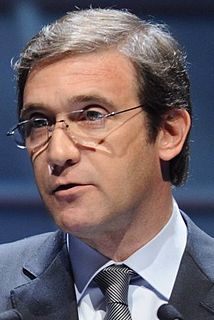
A legislative election was held in Portugal on 5 June 2011 to elect all 230 members of the Assembly of the Republic. Pedro Passos Coelho led the centre-right Social Democratic Party to victory over the Socialist Party, led by incumbent Prime Minister José Sócrates. Despite a historically low turnout of less than 60% of registered voters, the right-wing won a clear mandate, winning nearly 130 MPs, more than 56% of the seats, and just over 50% of the vote. While the People's Party, continuing the trend they began in 2009, earned their best score since 1983, the Social Democrats exceeded the expected result in the opinion polls and won the same number of seats as they did in 2002, when the PSD was led by José Manuel Durão Barroso. Of the twenty districts of the country, Pedro Passos Coelho's party won seventeen, including Lisbon, Porto, Faro and the Azores, which has been governed by the Socialists since 1996.

A presidential election was held in Timor-Leste on 17 March and 16 April 2012 to choose a president for a five-year term. Incumbent president Jose Ramos-Horta, who was eligible for a second and final term as president, announced that he would seek nomination to be a candidate in the election. The election was seen as a test for the "young democracy" in seeking to take control of its own security. Former military commander Taur Matan Ruak provisionally beat Francisco Guterres in a second round runoff.

Parliamentary elections were held in East Timor on 22 July 2017. FRETILIN narrowly emerged as the largest party in the National Parliament, winning 23 seats to the 22 won by the National Congress for Timorese Reconstruction, which had been the largest party in the outgoing Parliament.
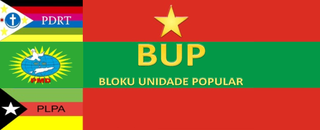
The Bloku Unidade Popular (Tetum) is a political party alliance in East Timor.

Early parliamentary elections were held in East Timor on 12 May 2018 after the National Parliament was dissolved by President Francisco Guterres on 26 January 2018.

